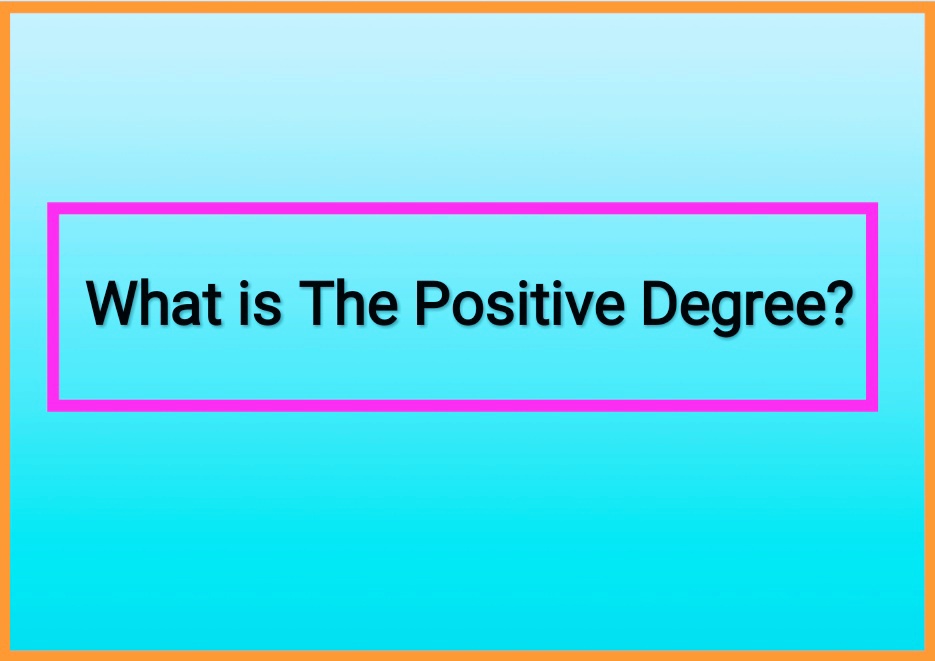What is The Positive Degree of Comparison?
"Positive degree" is a term related to adjectives and adverbs. An adjective or adverb that does not compare is called positive. (Usually in other words, "positive degree" is an adjective or normal form of a adverb.)
What is The Positive Degree?
Positive degree of comparison, no comparison is used. It is only used to describe the quality of a particular noun or pronoun that acts as the subject in a sentence. According to the education sciences topic, a positive degree of comparison is "related or formed to a degree of comparison that is expressed by the unchanged and unchanged form of an adjective or verb in English and does not imply any increase or decrease."Examples of Positive Degree of Comparison
Let's look at some examples of how to use a positive degree of comparison.- This is cold here.
- Nobody knew that he was such a talented boy.
- There is no one as intelligent as Einstein.
- This is wonderful flower.
- I walk slowly when I'm in the right mood.
- Bharath is not as clever as Sruthi.
- It is the primary objective.
- The sky is not clear.
- Squirrels are very tiny animals.
- I am wearing a white dress.
- The pen isn't light.
- Mount Everest isn't very high.
- Mariana Trench isn't very deep.
- Mango is very sweet.
- Lead isn't a heavy metal.
- Smith is a strong boy.
- Alex is a tall boy.
- America is a powerful country.
- Jarry is very beautiful.
You can check the list of adjectives and adverbs for a comprehensive list of adjectives. And how adverbs can be used to denote a positive degree of comparison.
How Many Positive Adjectives are There?
That's great! It's like counting the stars in the sky! Impossible to count. Name but not work:
- good
- nice
- righteous
- proper
- rich
- light
- hearty
- melodic
- famous
- pretty
- petite
- bright
- dainty
- fabulous
- caring
- dear
- sharp
- happy
- robust
- rosy
- comfy
- wise
- humble
- amazing
- gorgeous
- darling
- sagacious
- auspicious
- liberal
- grateful
- thankful
- captivating
- unassuming
- great
- precious
- elegant
- trusty
- patient
- loyal
- intellectual
- insightful
- clever
- willing
- witty
- hilarious
- humorous
- willowy
- agile
- tasty
- toothsome
- sound
- awesome
- brilliant
- thoughtful
Conclusion
You are learning many ideas with Education Sciences Topic. Through this blog, you will gain a good knowledge of the positive degree of adjectives and how they can be used to create sentences. These positive degrees of adjectives are very useful when drafting interesting content.Frequently Asked Questions on Positive Degree
What is Positive Degree?Answer: It depends on the surrounding conditions. For newcomers it is the negative opposite. It is the opposite of something that is perceptible in any way and exists at a distance (even as an illusion). More specifically positive degree things that we think are experienced or valuable, pleasurable, good, beautiful or true.
What is an Example of Adjectives Showing Positive Feelings?
Answer: Adjectives are used to increase/ add something in the sense of a noun or pronoun so we can say that each adjective is showing a positive feeling (in a good or bad sense).
What are Positive Adjectives Starting With I?
Answer: Positive adjectives starting with the letter I.
- Intelligent
- Industrious
- Impressive
- Intensive
- Idealistic
- Intriguing
- Imaginative
- Ingenious
- Innovative
- Inspiring
What is The Meaning and Definition of Positive Degree of Comparison?
Answer: The positive degree of comparison isn't used to make any comparisons. It's only used to say the quality contained by a particular noun or pronoun that acts as the topic in a sentence. According to Education Sciences Topic, a positive degree of comparison is one (1) "relating to, or forming, the degree of comparison. It is expressed in English by an unchanged and unchanged form of an adjective or An Adverb and does not imply any increase or decrease."














No comments:
Post a Comment